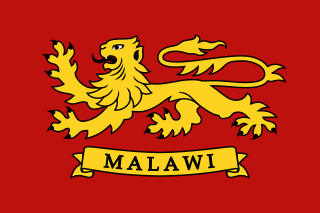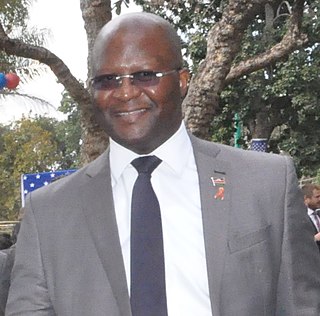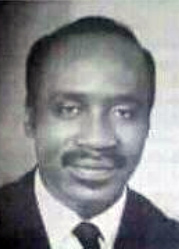Related Research Articles
The History of Malawi covers the area of present-day Malawi. The region was once part of the Maravi Empire. In colonial times, the territory was ruled by the British, under whose control it was known first as British Central Africa and later Nyasaland. It became part of the Federation of Rhodesia and Nyasaland. The country achieved full independence, as Malawi, in 1964. After independence, Malawi was ruled as a one-party state under Hastings Banda until 1994.

Politics of Malawi takes place in a framework of a presidential representative democratic republic, whereby the President of Malawi is both head of state and head of government, and of a multi-party system. Executive power is exercised by the government. Legislative power is vested in both the government and the National Assembly. There is a cabinet of Malawi that is appointed by the President of Malawi. The judiciary is independent of the executive and the legislature. The government of Malawi has been a multi-party democracy since 1994. The Economist Intelligence Unit rated Malawi a "hybrid regime" in 2019.

Hastings Kamuzu Banda was the Prime Minister and later President of Malawi from 1964 to 1994. In 1966, the country became a republic and he became president. His rule has been characterized as a "highly repressive autocracy."

The president of the Republic of Malawi is the head of state and head of government of Malawi. The president leads the executive branch of the Government of Malawi and is the commander-in-chief of the Malawian Defence Force.
Louis Joseph Chimango was a long-time cabinet minister in Late Hastings Kamuzu Banda's cabinet from 1978 to 1994. He had trained as a lawyer and later on as a barrister from Grays Inn in London. He later taught at the law school at Chancellor College in Zomba, a constituent of the University of Malawi, from 1970, before being nominated for politics in 1978. He left the law school when he was the dean of the Faculty of Law. During Late Kamuzu Banda's time he held a number of cabinet portfolios including those of Minister of Finance, Health, Local Government, and Education, among others. After Late Kamuzu's defeat in the 1993 referendum he maintained his seat in Parliament and was later elected Speaker of the National Assembly of Malawi from June 2005-June 2009. A member of the Malawi Congress Party, he represented the Lilongwe Mpenu Nkhoma constituency, a seat which he lost during the 1999 Late Bingu wa Mutharika's regime. He was also a member of the Pan-African Parliament.

Joyce Hilda Banda is a Malawian politician who was the President of Malawi from 7 April 2012 to 31 May 2014. Banda took office as President following the sudden death of President Bingu wa Mutharika. She is the founder and leader of the People's Party, created in 2011. An educator and grassroots women's rights activist, she was the Minister of Foreign Affairs from 2006 to 2009 and the Vice-President of Malawi from May 2009 to April 2012. She had served in various roles as a member of Parliament and as Minister of Gender and Child Welfare before she became the President of the Republic of Malawi.
Chakufwa Chihana was a Malawian human rights activist, pro-democracy advocate, trade unionist and later, politician. He held the post of Second Vice President in Malawi, under President Bakili Muluzi. He is often called the 'father of Malawian democracy'. He served as leader of Malawi's first underground political movement, which urged President Hastings Kamuzu Banda, who had ruled for three decades, to call for a referendum on political pluralism. He was awarded the Robert F. Kennedy Human Rights Award in 1992.

Malawian-South African relations refers to the bilateral relationship between Malawi and South Africa. South Africa's first formal relationship with an independent African country was established with Malawi, beginning in 1967.

Cecilia Tamanda Kadzamira was the official hostess of Malawi during the reign of Hastings Banda. Whilst she and Banda were not officially married, she served as the first lady or official hostess for several years. For several years, she was the most powerful woman in Malawi. Kadzamira, is referred to as "Mama", or "Mother of the Nation".
Jim Jumani Johansson was a Malawian-Swedish man who claimed to be the son of the late Malawian President Hastings Kamuzu Banda (1898–1997). He changed his name to Jim Jumani Immanuel Masauko Kamuzu Banda. Johansson says that it was after Banda died in 1997 that 'some government officials' told him about who his father really was. Officially, Banda died childless and unmarried. His claim and resemblance to the former dictator opened up many unanswered questions about the legacy of Banda. Johansson became a celebrity overnight in Malawi owing to his uncanny resemblance to the former president and his measures to seek legal means of proving his identity. Malawians were divided on whether he was the true heir but the public demanded a right to know as well. Focus Gwede, the head of Banda's Special Branch of Secret Police Services, came out in support of Johansson, claiming in 2010 that Banda had fathered three children.
The Malawi Young Pioneers (MYP) were the paramilitary wing of the Malawi Congress Party. Their Commander-in-Chief was President Hastings Kamuzu Banda. They originally were supposed to function as a national youth service program with a development agenda. However over time, they strayed away from this agenda and became an intricate network of espionage and terror. The Young Pioneers were a major instrument for the operationalisation of Dr Banda's one-party totalitarian dictatorship and domestic terrorism. Pioneers bore arms, conducted espionage and intelligence operations, and were Banda's most trusted bodyguards around Hastings Kamuzu Banda. Both the Malawi Army and Police resented the Pioneers for usurping their roles as security agents.

Atupele Muluzi is a Malawian politician, businessman and was a Member of Parliament for Machinga North East constituency from 2004 until May 27, 2019. He is also the President of the United Democratic Front and was a presidential candidate during the 2019 election. He was a running mate in the 2020 presidential elections, on a coalition ticket with incumbent President Peter Mutharika of the Democratic Progressive Party. Muluzi was Minister of Natural Resources, Energy and Mining from 2014 to 2015 and the only opposition member to serve in the Mutharika administration. Subsequently, he served as Minister of Home Affairs and Internal Security in 2015, and then Minister of Lands, Housing and Urban Development in 2015. He is currently Minister of Health. He is the son of former president Bakili Muluzi.
Harry Thomson, also known as "Clean Harry", was a Malawian politician. He was born in Zomba, the capital of Nyasaland. He was a founding member of the United Democratic Front party (UDF) and a Minister of Trade and Industry.
Sam Mpasu was a Malawian politician, author, and former diplomat. He served as Minister of Commerce, Secretary General of the United Democratic Front (UDF) in 1999, and speaker of the Malawi National Assembly.

The Malawian Defence Force is the state military organisation responsible for defending Malawi. It originated from elements of the British King's African Rifles, colonial units formed before independence in 1964.
TwaibumohamediJohn Twaibu Sangala was a Malawian cabinet Minister and one of the Mwanza four. He was the Minister of Health for Malawi. He died in a mysterious death in 1983 together with two other cabinet ministers Aaron Gadama and Dick Matenje– and Member of Parliament David Chiwanga. Their deaths were ruled as a 'traffic accident' by the Kamuzu Banda regime, however, this was not the case.
David Chiwanga was a Malawian Member of Parliament who was one of the Mwanza Four. He was the MP for the Chikwawa District and was thought to be a secret critic of President Kamuzu Banda. He disappeared in 1983 together with three cabinet ministers: Dick Matenje, Aaron Gadama, and Twaibu Sangala. Their deaths were ruled accidental by Kamuzu Banda. In 1995, seven people, including Kamuzu Banda, were brought to trial over the deaths but were acquitted due to lack of evidence.

Albert Andrew Muwalo Gandale Nqumayo was a prominent politician in Malawi from the 1960s until he was sacked in 1976 and was executed in 1977. He entered politics in the mid 1950s through involvement in a hospital worker's trade union and membership of the Nyasaland African Congress, where his activities led to his detention without trial during the 1959 State of Emergency in Nyasaland. After his release, he joined the Malawi Congress Party (MCP), and became locally prominent in Ntcheu District as district MCP chairman and from 1962 as Member of Parliament for Ntcheu South. In 1963, he became Administrative Secretary of the MCP, and he was a prominent supporter of the then-Prime Minister, Hastings Banda during the Cabinet Crisis of 1964. Muwalo was rewarded for his loyalty with the cabinet post of Minister of Information in 1964, and in 1966 he became Minister of State in the President's Office. His close contact with Banda, both as minister in Banda's office and in the MCP gave him great power and, during the first half of the 1970s he and his relative, the Head of the Police Special Branch Focus Gwede, were heavily involved in the political repression of actual or suspected opponents of the Banda regime. In 1976 he and Gwede were arrested: the reasons for their arrests were unclear, but may have resulted from a power struggle among those around the ageing president or simply because he became too powerful and may have been seen by Banda as a threat. In 1977, the two were tried before a Traditional Court and after a trial whose fairness was in serious doubt, were both sentenced to death. Gwede was reprieved, but Muwalo was hanged on 3 September 1977.

General elections were held in Malawi on 20 May 2014. They were Malawi's first tripartite elections, the first time the President, National Assembly and local councillors were elected on the same day. The presidential election was won by opposition candidate Peter Mutharika of the Democratic Progressive Party, who defeated incumbent President Joyce Banda.

The Judiciary of Malawi is the branch of the Government of Malawi which interprets and applies the laws of Malawi to ensure equal justice under law and to provide a mechanism for dispute resolution. The legal system of Malawi is based on English law, modified since 1969. The Constitution defines the judiciary as a hierarchical system of courts, with the highest court being a Supreme Court of Appeal, together with a High Court and a number of magistrates' courts. Malawian judiciary has frequently demonstrated its independence in recent years. The constitutional court of Malawi nullified the 2019 election results, citing widespread irregularities. The Supreme court upheld the verdict of the constitutional court. Five Constitutional Court judges who overturned the results of 2019 election has been nominated by UK thinktank Chatham House for the 2020 Chatham House Prize.Ultimately the judges went onto win the prize.
References
- 1 2 3 http://www.afriquejet.com/index.php?option=com_content&view=article&id=188&Itemid=435 Archived 2012-07-18 at archive.today
- ↑ Malawi inflation soars to 34.6 percent Archived 2013-01-28 at archive.today
- ↑ Revolt of the Ministers: The Malawi Cabinet Crisis, 1964-1965 By Colin Baker p 322
- ↑ AfricaNews - ``Kamuzu Banda had three children`` - The AfricaNews articles of Mtheto Lungu Archived 2012-07-20 at archive.today